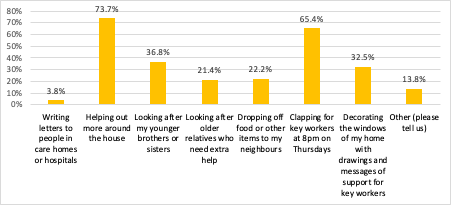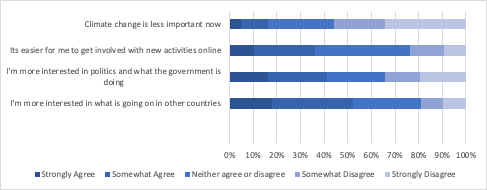One of our key priorities at WISERD this year has been to understand the impact of COVID-19 on children and young people in Wales. This is especially important as infection rates continue to rise as we head into winter. In addition to our recent seminar and blogs on home learning during a pandemic, here we highlight children’s experiences of home during lockdown, how they have supported others, and their views on government responses to the pandemic.
We surveyed over 500 children from secondary schools around Wales during June and July 2020 that are already taking part in the WISERD Education Multi Cohort Study (WMCS). In this blog we share some initial findings about how they helped family, neighbours and friends, how they supported voluntary organisations, their increased interest in news and politics and their support for the Welsh Government’s approach to dealing with COVID-19.
Helping out at home
Since the beginning of lockdown, 73.7% of children in our study said that they had been “helping out more around the house”. This included things like taking care of pets, gardening, decorating and doing food shopping.
The children in our study also reported looking after other family members: 36.8% said they had been looking after younger siblings, and 21.4% said they had been looking after older relatives who needed extra help.

Figure 1: Percentage of children who took part in activities to support others during lockdown
We know that it is especially difficult to do research with children during a pandemic, and that some children may not have been able to access and complete the survey. Although we need to be aware of response bias when interpreting these results, they give an interesting indication of the kinds of things that some children in Wales have been doing.
When asked to comment, many children highlighted the importance of keeping in contact with relatives who might be feeling lonely. For some this meant calling family members that they could no longer visit in person, writing letters or sending parcels. Despite making an effort to keep in touch, over three quarters of children said that they were missing their grandparents (78.1%).
Supporting neighbours and the local community
In addition to helping out at home, the children in our survey were also involved in helping others in their community.
One in five (22.2%) of children who completed the survey said that they had helped with dropping off food or other items to their neighbours, including food, newspapers and PPE. Respondents also reported walking their neighbours dogs and making an effort to be more friendly when exercising outdoors:
“I try to say hi to other people when I walk my dog more often and smile loads.”
Even though lots of volunteering activities stopped during lockdown, children supported causes by donating, fundraising, sewing or baking:
“Sewing masks”
“Raising money with my rugby club for an old people’s home”
“Made cakes for care homes and hospital”
“Donating to food banks and others who need it”
“Baked cakes for hospital and care homes with my mum”
Almost two thirds (65.4%) of children had taken part in clapping for key workers and around one in three children (32.5%) had decorated the windows of their homes with drawings or messages of support.
Of course, some children based in more rural areas reported that there were few opportunities to help others during lockdown. One participant, for example said that they had done none of the things listed because they “live in the middle of nowhere”. Others said that they had helped out with farm work locally because farmers struggled to get their usual workers in.
Supporting friends
The children in our study also highlighted the importance of checking in on and supporting their friends. Comments included making a special effort with friends who might be particularly vulnerable or isolated, and making sure to mark birthdays with cards and presents even though they were unable to celebrate together as normal:
“Sending friends supportive messages if they are struggling”
“Face Timing people who I think are feeling lonely”
“Dropping off presents to friends who have to have their birthdays on their own”
Changed views during lockdown?
Just over half of the children surveyed said that since lockdown, they had become more interested in what is going on in other countries (52.1%). Some commented that they had spent time during lockdown signing petitions and campaigning for causes that they care about, including Black Lives Matter.
Our data also indicate that climate change remains an important issue for children and young people in Wales, with the majority of participants disagreeing with the statement that ‘climate change is less important now’ (55.7% either somewhat or strongly disagreed).
Children’s views on government responses to COVID
We were also interested to know how much children in Wales knew about the different approaches to lockdown being taken in different parts of the UK. Almost all of our child respondents (94.3%) knew that lockdown rules are different in Wales compared to England, and 41.3% agreed that they had become more interested in politics and what the government has been doing during lockdown.

Figure 2: Children’s views during lockdown
Interestingly, even though 93.2% of participants agreed that people in England have more freedom to see people they don’t live with, the overwhelming majority (91.0%) said that Wales has the better approach to dealing with COVID-19 lockdown.
This suggests that even though many children were missing spending time with grandparents and friends, they preferred the more cautious approach being taken in Wales.
We are delighted to have received new funding from the Welsh Government to continue this important longitudinal study. This will allow us to collect two further sweeps of data from our cohorts in 2021 and 2022. This includes following our existing cohorts into Years 9 and 11 and starting a new Year 7 Cohort.
